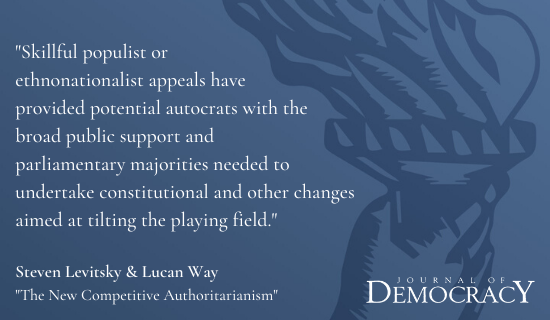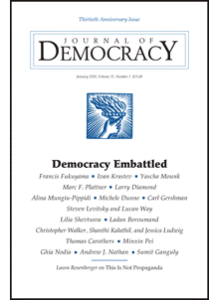
In the nineteen-thirties, authoritarian regimes were on the rise around the world—as they are again today—and democratic governments that came into existence after the First World War were toppling. “American democracy, too, staggered,” Jill Lepore writes in The New Yorker, “weakened by corruption, monopoly, apathy, inequality, political violence, hucksterism, racial injustice, unemployment, even starvation.” Lepore talks with David Remnick about how Americans rallied to save democracy, and how we might apply those lessons in a new era that poses similar problems.
 Competitive authoritarianism—in which the coexistence of meaningful democratic institutions and serious incumbent abuse yields electoral competition that is real but unfair—is alive and well, nearly two decades after the concept was introduced in the Journal of Democracy, Lucan Way writes for PONARS Eurasia. This is surprising, because the Western liberal hegemony of the 1990s, which led many full autocracies to become competitive authoritarian, has waned. Competitive politics persists because many autocrats lack the coercive and organizational capacity to consolidate hegemonic rule, and because the alternatives to multiparty elections lack legitimacy across the globe.
Competitive authoritarianism—in which the coexistence of meaningful democratic institutions and serious incumbent abuse yields electoral competition that is real but unfair—is alive and well, nearly two decades after the concept was introduced in the Journal of Democracy, Lucan Way writes for PONARS Eurasia. This is surprising, because the Western liberal hegemony of the 1990s, which led many full autocracies to become competitive authoritarian, has waned. Competitive politics persists because many autocrats lack the coercive and organizational capacity to consolidate hegemonic rule, and because the alternatives to multiparty elections lack legitimacy across the globe.
 Systematic efforts to tilt the playing field against political opponents were widely believed to be a thing of the past in established Western democracies, Way and Steven Levitsky write for the NED’s Journal of Democracy:
Systematic efforts to tilt the playing field against political opponents were widely believed to be a thing of the past in established Western democracies, Way and Steven Levitsky write for the NED’s Journal of Democracy:
Western states possess strong democratic antibodies, including robust political and legal institutions, highly developed private sectors and civil societies, and well-organized oppositions. The extensive financial and organizational resources available to oppositions in established Western democracies make it much harder to tilt the playing field in these states than it is in, say, Kenya, Turkey, Ukraine, or Venezuela. Nevertheless, the emergence of more subtle and sophisticated authoritarian strategies, along with the evolution of effective nationalist and populist discourses capable of building majority support for such practices, is a major cause for concern.
Competitive authoritarianism is not only thriving but inching westward, Levitsky and Way caution. No democracy can be taken for granted.







